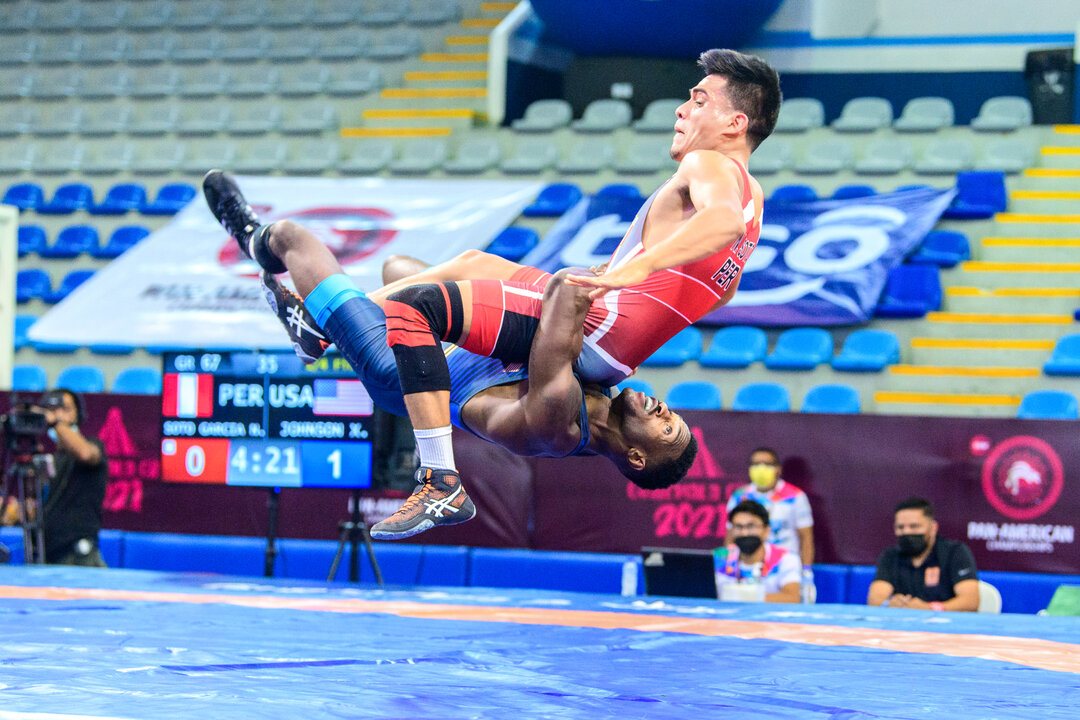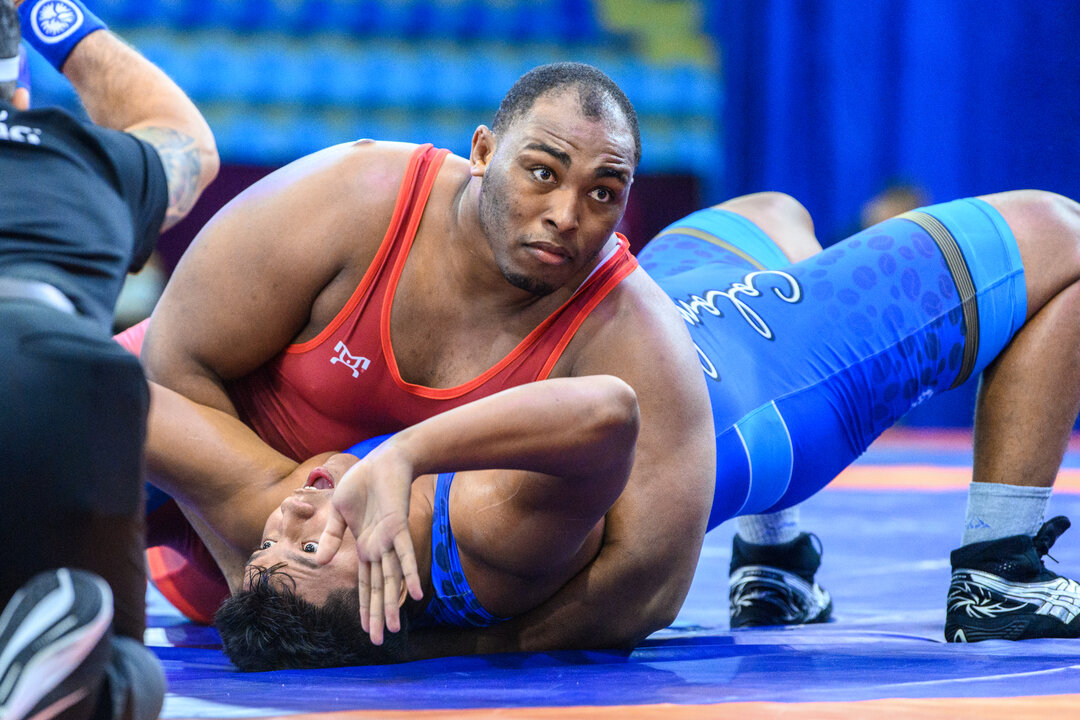Mejia Castillo Becomes Honduras' First Senior Pan-American Champ
Friday, May 28, 2021 - 13:51 By Taylor Miller

GUATEMALA, Guatemala – For the first time in history, an athlete from Honduras will bring home a Senior Pan American gold medal, thanks to Kevin MEJIA CASTILLO (HON), who dominated the 97kg bracket in Greco-Roman on Thursday at the 2021 Pan American Championships.
En route to his title, Mejia had to defeat young, up-and-coming American Braxton AMOS (USA) twice today, once in pool action and later in the final. Mejia controlled both matches, winning both in spectacular 9-0 fashion. The win marks his fifth Pan American medal with the last a bronze from the 209 Pan Am Championships.
Taking the crown at 60kg was Dicther TORO CASTANEDA (COL), who took down 2020 Olympian Ildar HAFIZOV (USA) in the finals. Toro Castaneda led 5-0 at the break before sealing the match with exposure points after being put down in par terre. The Colombian won 7-3. This is his second-consecutive Pan Am title. He also owns a silver medal from the 2019 Pan American Games in Lima.
Andres MONTANO ARROYO (ECU) also won his fifth Pan Am gold medal, defeating Randon MIRANDA (USA) for the second time today.
Earlier in the day, Montano Arroyo shut out Miranda, 5-0, but in the finals, Miranda closed the gap but it was not enough as Montano Arroyo ultimately won 7-6. Montano Arroyo adds to his collection of titles, including three Pan Am Championships golds (2017, 2019, 2021) and two Pan Am Games golds (2015, 2019).
 Xavier JOHNSON (USA) throws Nilton SOTO GARCIA (PER) in their quarterfinal meeting. (Photo: Tony Rotundo)
Xavier JOHNSON (USA) throws Nilton SOTO GARCIA (PER) in their quarterfinal meeting. (Photo: Tony Rotundo)
Two athletes from the United States scored titles on Thursday: Xavier JOHNSON (USA) and Jamel JOHNSON (USA) at 67kg and 72kg, respectively.
X. Johnson dominated Enyer FELICIANO (DOM) in just 1:12 with three huge throws, including a five-pointer for an 11-0 win in the 67kg finals. This is his first international gold medal and first appearance at the Pan American Championships.
J. Johnson competed at 72kg, where he suffered an injury in one of his earlier bouts. However, he overcame the challenge to win the weight in round-robin action. In his last match of the day, J. Johnson was trailing 5-0 to Gerardo OLIVA MONTES (PER) but registered two four-point throws to emerge victorious, 8-5.

Leo SANTANA HEREDIA (DOM) scores a fall against Steven RIANO CATANO (COL) in their opening-round meeting. (Photo: Tony Rotundo)
At heavyweight, Leo SANTANA HEREDIA (DOM) collected his third Pan Am medal, winning gold at 130kg. In the finals, he controlled Donald LONGENDYKE (USA) in a low-scoring match to win 3-0. Santana Heredia also has bronze medals from the 2019 Pan Am Games and the 2020 Pan Am Championships.
The competition continues tomorrow with the Greco-Roman and women’s freestyle. Wrestling begins at 12 p.m. local time. Fans can watch all the action live at uww.org.
GUATEMALA, Guatemala – Por la primera vez, un atleta de Honduras logró una medalla de oro panamericana en la categoría Senior cuando Kevin MEJIA CASTILLO (HON) dominó la competencia en 97 kg en estilo grecorromana el jueves en el Campeonato Panamericano.
Mejia Castillo derroto a Braxton AMOS (USA) dos veces el jueves, primero en el acción pool y luego en el final. Los dos veces, Mejia Castillo ganó 9-0. Esto marca su quinta medalla panamericana. La última vino en 2019 cuando metió una medalla de bronce.
En 60 kg, Dicther TORO CASTANEDA (COL) ganó el gran premio. En el final, encontró al olímpico estadounidense Ildar HAFIZOV (USA). Toro Castaneda estaba ganando 5-0 en el periodo del descanso, y en el segundo periodo, aprovechó a una situación para sumar más puntos y sellar la victoria, 7-3. Esta es su segunda victoria consecutiva en el campeonato panamericano. Ganó la misma categoría en 2020. También tiene una medalla de plata de los los Juegos Panamericanos de Lima 2019.
Andres MONTANO ARROYO (ECU) ganó su quinta medalla de oro panamericana, derrotando a Randon MIRANDA (USA) por la segunda vez del día. Esta mañana, Montano Arroyo ganó 5-0 contra Miranda, pero en la final de 63 kg Miranda cerró la brecha pero no fue suficiente. Montano Arroyo salió victorioso, 7-6. Ahora, Montano Arroyo tiene tres oros en campeonatos panamericanos (2017, 2019, 2021) y dos oros de los juegos panamericanos (2015, 2019).
Dos estadounidenses ganaron medallas de oro: Xavier JOHNSON (USA) y Jamel JOHNSON (USA) en las categorías 67 kg y 72 kg.
X. Johnson dominó a Enyer FELICIANO (DOM) en solo 1:12 con tres lanzamientos para terminar con una victoria, 11-0, en el final de 67 kg. Es la primera medalla de oro internacional para él y fue su debut panamericano.
J. Johnson compitió en 72 kg donde sufrió una herida más temprano en el día, pero él se la superó para ganar la categoría. Fue un grupo de round robin. En su final combate del día, J. Johnson estaba perdiendo contra Gerardo OLIVA MONTES (PER), pero usó dos lanzamientos valiendo cuatro puntos para asegurar el oro, 8-5.
En 130 kg, Leo SANTANA HEREDIA (DOM) recibió su tercera medalla panamericana, ganando el oro. En el final, derrotó a Donald LONGENDYKE (USA) en un combate de pocos puntos pero Santana Heredia controló el partido para ganar 3-0. También tiene dos medallas de bronce de los Juegos Panamericanos de Lima 2019 y del campeonato panamericano de 2020.
La competencia sigue mañana con el estile grecorromana y el estil femenino. Empieza a las 12 p.m. hora local. Se puede ver toda la acción en uww.org.
Greco-Roman Results
60kg
GOLD – Dicther TORO CASTANEDA (COL) df. Ildar HAFIZOV (USA), 7-3
BRONZE – Maikol JOSEFA (DOM) df. Victor LOPEZ MIRANDA (ESA), 9-0
BRONZE – Marat GARIPOV (BRA) df. Joshua MEDINA (PUR), 9-0
63kg
GOLD – Andres MONTANO ARROYO (ECU) df. Randon MIRANDA (USA), 7-6
BRONZE – Emerson FELIPE ORDONEZ (GUA) df. Joao BENAVIDES ROCHABRUN (PER), 6-4
67kg
GOLD – Xavier JOHNSON (USA) df. Enyer FELICIANO (DOM), 11-0
BRONZE – Diego MARTINEZ DE LEIJA (MEX) df. Juan PALMA FRANCIS (ECU), 9-0
BRONZE – Calebe CORREA FERREIRA (BRA) df. Nilton SOTO GARCIA (PER), 6-1
72kg
GOLD – Jamel JOHNSON (USA)
SILVER – Juan RUIZ LUGO (MEX)
BRONZE – Carlos FUENTES PERALTA (GUA)
97kg
GOLD – Kevin MEJIA CASTILLO (HON) df. Braxton AMOS (USA), 9-0
BRONZE – Igor ALVES DE QUEIROZ (BRA) df. Ricardo MANCILLA GALINDO (MEX), 7-3
130kg
GOLD – Leo SANTANA HEREDIA (DOM) df. Donald LONGENDYKE (USA), 3-0
BRONZE – Isaque MEDEIROS CONSERVA (BRA) df. Luis ROMAN BARRIOS (MEX), fall


 Rei HIGUCHI (JPN) wrestling at the Lehigh University. (Photo: Courtesy of Lehigh University)
Rei HIGUCHI (JPN) wrestling at the Lehigh University. (Photo: Courtesy of Lehigh University) Lehigh University wrestling training room.
Lehigh University wrestling training room. Rei HIGUCHI (JPN) with wife Yuki and daughter Nagi at the airport before flying to the United States. (Photo: Rei Higuchi / X)
Rei HIGUCHI (JPN) with wife Yuki and daughter Nagi at the airport before flying to the United States. (Photo: Rei Higuchi / X) Posing with Jordan BURROUGHS (USA) and others at the 2017 NCAA Championships in St. Louis. (Photo courtesy of Rei Higuchi)
Posing with Jordan BURROUGHS (USA) and others at the 2017 NCAA Championships in St. Louis. (Photo courtesy of Rei Higuchi) Playing the role of the typical tourist at the Statue of Liberty in New York in February. (Photo courtesy of Rei Higuchi)
Playing the role of the typical tourist at the Statue of Liberty in New York in February. (Photo courtesy of Rei Higuchi)
Share your thoughts.
Comments